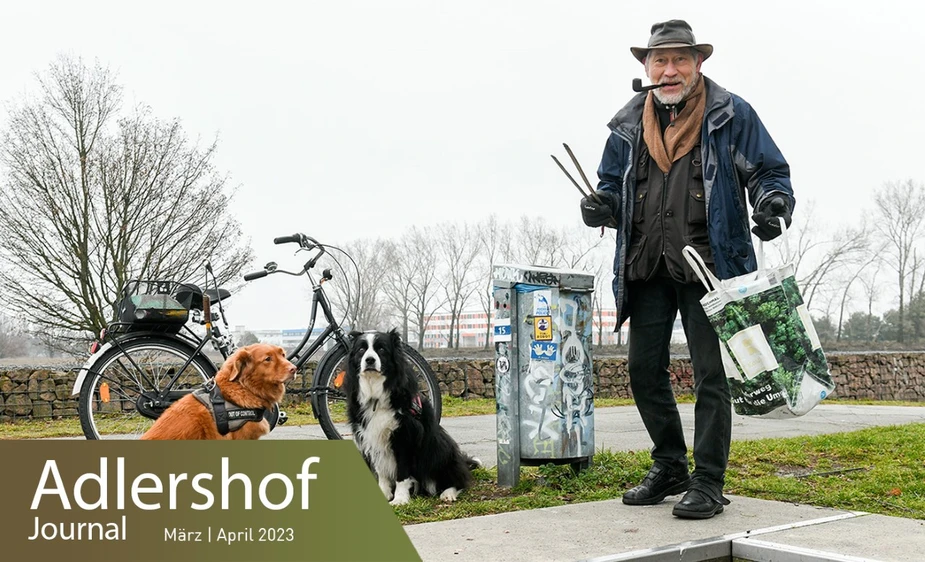The honorary sweeper
Kurt Kann-Klara makes sure the historical airfield stays clean
He always has his tools with him. Garbage bags, hand sweep and dustpan, all are at the ready in his bicycle basket. Additionally, he has a pair of gripping tongs that help him pick up rubbish without bending down. And so, the three of them head out every day, Zewerino and Bravo, the two dogs, and Kurt Kann-Klara, their owner, who keeps his eyes peeled at all times: “I scan the area and pick everything up that I see.” Paper handkerchiefs, plastic bottles, beer cans, and many other things that simply do not belong in a forest or on a heath. “Combining the good and the useful,” is what Kann-Klara calls it.
From his house on Arthur Müller Strasse, he has a good view of his object of care, the landscaped park with its steppe and bush vegetation, rare birds and plants, which was created on the historical area of Adlershof’s airfield about a decade and a half ago. Kann-Klara has been living on the border of Johannisthal and Adlershof since 2006. The state of the neighbouring green spaces has been a thorn in his side from the beginning. Glass, packaging, plastic waste: “There came a point where the rubbish got too much for me.”
What started as an occasional pastime, Kann-Klara has turned into a daily activity. He has been doing the rounds for three years now, inspired by an initiative of Berliner Stadtreinigung, Berlin’s municipal waste management company, which calls for volunteers on a website called “Kehrenbürger”, or “honorary sweepers”. For the now 66-year-old Johannisthal native who spent his entire life in Berlin’s southeast, Schöneweide, Köpenick, and now Johannisthal, landscape conservation is a topic that is deeply rooted in his biography.
At a young age, he studied agricultural science at Humboldt-University Berlin. His doctoral thesis in 1984 focused on how to prevent nitrogen fertiliser from contaminating groundwater in sandy soils during fall tillage. Until the fall of the Wall, Kann-Klara worked at the East German ministry for agriculture, forestry and food industry as an expert in organic fertilisation. He looks back on this with mixed feelings. Overfertilisation due to masses of manure had been a "huge problem" then and still is today: “The soil is a living system. What we as the users of that system do to it can be considered malicious at best.”
So far Kann-Klara is doing his dog-walking and garbage-collecting rounds alone. He would like to see his example inspire other people and other “honorary sweepers” to join the ranks: “In the GDR, we had spring cleaning events in residential areas. This not a new thing.” However: “People nowadays only see their own problems.” Leaving communal tasks to the authorities, like leaving city cleaning to the municipal waste company because it is “paid to do it”, is a very widespread and convenient attitude, he says.
To be sure, the parks department was doing the best it can. But they did not have the resources to keep all the city’s remote corners clean and tidy. For Kann-Klara, this is where community involvement should come into play: “Don’t wait for the government – the people have to do it!”
Dr. Winfried Dolderer for Adlershof Journal
- Kehrenbürger of the BSR (website in German)
- Landscaped park Johannisthal/Adlershof
